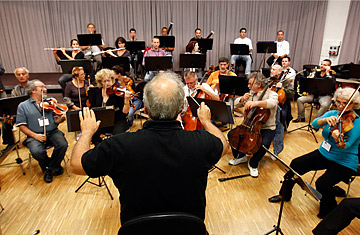
Roberto Paternostro conducts the Israel Chamber Orchestra during a rehearsal in Bayreuth July 24, 2011. For the first time in history, the Israel Chamber Orchestra will play a work of the German composer Richard Wagner during a concert in Bayreuth.

This post is in partnership with Worldcrunch, a new global-news site that translates stories of note in foreign languages into English. The article below was originally published in Süeddeutsche Zeitung
BAYREUTH — Dan Erdmann was in the audience during a guest appearance in Israel by the Berlin State Choir. As the concert ended, conductor Daniel Barenboim announced that he wanted to do an encore. He wanted to play some music by Richard Wagner.
Wagner in Israel.
There are photographs of the moment: Barenboim is turned towards the audience, addressing its protests. Barenboim tried to explain that people were free to leave the concert hall if they could not find it within themselves to accept this encore. Dan Erdmann was 17 years old at the time. He stayed. Hearing Wagner music played in concert was something he'd never been able to do before. "It was a wonderful experience," he says.
That was July 2001. Practically to the day, 10 years later, Erdmann is in Bayreuth. The members of the Israel Chamber Orchestra are rehearsing a piece of music they never practiced in Israel out of respect for those who consider it scandalous to play Wagner's music in the Jewish state.
Dan Erdmann is the orchestra's solo clarinetist. A year ago, Roberto Paternostro sounded him out about going to Bayreuth to play Wagner. Paternostro, an Austrian of Jewish heritage, is the conductor of the Tel Aviv-based orchestra. His proposal was something of a dare, although he says he never imagined it would cause such an uproar. One member of the Israeli parliament even wanted to go so far as to review whether the orchestra should continue to receive state subsidies if it went to Germany — and not just Germany, but Bayreuth — and played music by Wagner. The orchestra was breaking two taboos in a single concert.
In Israel, Richard Wagner has traditionally been considered the man who composed the soundtrack for the Holocaust. His music is sometimes played on the radio, but there have only been a few attempts to include it on concert hall programs. One conductor who tried it was Zubin Mehta. He was fiercely criticized. Twenty years later, in 2001 when Barenboim tried it, he was accused of "cultural rape."
Did Paternostro ever consider cancelling the Bayreuth appearance? The Israeli conductor gives the question a moment's thought and then replies: "Never." He goes on to say that he respects criticism and can understand that people "who still have a concentration camp tattoo don't want to have anything to do with an anti-Semite like Wagner." However, he grew up with Wagner's music; at the age of 10 he heard the Götterdämmerung for the first time in Vienna and was "bitten by the bug."
Paternostro asked all orchestra members if they wanted to go; only one stayed home. On Tuesday, July 26, at the concert at Bayreuth City Hall, Erdmann sat there taking it all in as if he couldn't quite believe it. The concert did not take place within the actual Festspiele program — a Wagner opera program, with performances between July 25 and Aug. 28 — but within the framework of the annual festival that takes place for the 100th time this year.
Katharina Wagner, the composer's great-grand-daughter and a director of the festival, was sitting in the first row at the concert. She played an on-again, off-again role in the lead-up to it: when Paternostro approached her with the idea she seemed to embrace it, but then did not attend the press conference Bayreuth's mayor held for the orchestra's arrival on Sunday. At the concert, she appeared stirred by the music, but did not join the orchestra up on stage at the end of the show.
The chamber orchestra played music by Israeli composer Tzvi Avni, Mahler, Mendelssohn and Liszt. The last piece on the program was the Siegfried Idyll by Richard Wagner, a very tender, private composition. The piece could have been played with more precision. But as already mentioned, the orchestra hadvery little time to practice it. Still, it would have been hard to find a more moving Idyll. When the orchestra stopped playing, the audience rose from their seats and the applause only began to ebb when the first violinist gave orchestra members the sign that they could start leaving the stage.
When Hitler was in power, the town of Bayreuth was celebrated as a power center of National Socialism. The Festspiele played out almost like some kind of ersatz religious ceremony, and the Wagner clan was all too glad to go along with the madness. Dan Erdmann, the young clarinetist, knows all about the background history. "But our generation has to build bridges," he says.
Read the original article in German.
Also from Worldcrunch:
Egypt's Street Children Still Waiting For Signs Of Arab Spring
— Al-Masry Al-Youm
A Year After Massive Fires, Is Russia Burning Again?
— Kommersant
Mercedes-Benz Goes Pedal To The Metal In China
— Economic Observer
